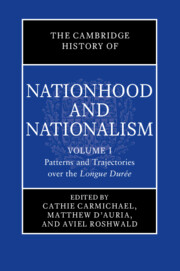Book contents
- The Cambridge History of Nationhood and Nationalism
- The Cambridge History of Nationhood and Nationalism
- The Cambridge History of Nationhood and Nationalism
- Copyright page
- Contents
- Figures
- Contributors
- General Introduction
- Part i The Politics of Ethnicity, Nationhood, and Belonging in the Settings of Classical Civilizations
- 1 Nationality and Ethnicity in the Ancient Near East
- 2 Nationhood: Was There Such a Thing in Antiquity?
- 3 The Holy Roman Empire
- 4 Ancient China
- 5 Politicized Ethnicity in Precolonial Southeast Asia
- 6 “India” before the Raj: Space and Identity in South Asian History
- Conclusion to Part I
- Part ii Paradigm Shifts and Turning Points in the Era of Globalization, 1500 to the Present
- Index
- References
3 - The Holy Roman Empire
from Part i - The Politics of Ethnicity, Nationhood, and Belonging in the Settings of Classical Civilizations
Published online by Cambridge University Press: 27 October 2023
- The Cambridge History of Nationhood and Nationalism
- The Cambridge History of Nationhood and Nationalism
- The Cambridge History of Nationhood and Nationalism
- Copyright page
- Contents
- Figures
- Contributors
- General Introduction
- Part i The Politics of Ethnicity, Nationhood, and Belonging in the Settings of Classical Civilizations
- 1 Nationality and Ethnicity in the Ancient Near East
- 2 Nationhood: Was There Such a Thing in Antiquity?
- 3 The Holy Roman Empire
- 4 Ancient China
- 5 Politicized Ethnicity in Precolonial Southeast Asia
- 6 “India” before the Raj: Space and Identity in South Asian History
- Conclusion to Part I
- Part ii Paradigm Shifts and Turning Points in the Era of Globalization, 1500 to the Present
- Index
- References
Summary
Since the nineteenth century, the Holy Roman Empire has occupied a central but often negative place in accounts of German nationhood. “In the beginning was the Reich,” declared Heinrich August Winkler in his monumental German history, which took as its starting point the empire’s abolition in 1806.1 It was with the empire that, in Winkler’s view fatally, “that which distinguishes German history from the history of the great western-European nations has … its origin.” Winkler’s judgment reflects a viewpoint which has been tenacious and highly influential: that at the heart of the problem of German nation-making lay the peculiar and deficient character of Germany’s premodern “state,” the empire itself. Whereas other European nations had developed within the framework of governments exercising sovereign power over firmly bounded populations, the Reich, after a promising start, had fallen prey to universalist fantasies, fragmentation, institutional atrophy, and the interference of foreign powers.
- Type
- Chapter
- Information
- The Cambridge History of Nationhood and Nationalism , pp. 54 - 75Publisher: Cambridge University PressPrint publication year: 2023

